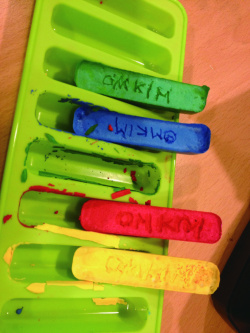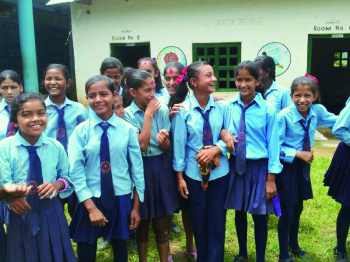
On a hot summer day under the sizzling sun, two people peep through the back door of a hotel. After a few minutes, they groan their way to the car with big boxes in their arms. The box, weighing five kilograms, is full of used soaps. The thought of making new soaps with the used ones and delivering them to Third World children leaves the president and vice president of Omkim smiling.
Omkim, an official Youth Non-governmental Organization registered under the Seoul Metropolitan Government since April 2013, was founded in February 2012 with student members from 15 different universities.
Omkim, which means to move in Korean, represents its spirit –to pump value into the abandoned. There are four major projects that Omkim carries out to make new values: soaps, crayons, banners and recycled papers. What Omkim is mostly known for is “Soap Omkim,” a project that makes new soaps by using used ones and delivers them to Third World children.
“There are people who are dying because they cannot wash their hands,” said Yi Doo-yeong (Sungkyunkwan University, 4), the vice president of Omkim. “Five million children are dying due to bad hygiene. Also, I realized there are children out there who are not loved by their own family, a kind of love I took for granted. I wanted to help and save those children.”
It has been two and a half years since Omkim started the soap project and the size of the project is increasing at a rapid pace.

The soaps are then taken to volunteer centers around Seoul where students who visit the places for volunteer work peel and shave the soaps into various shapes.
“Many students come to volunteer without knowing the seriousness of the problems in Third World countries,” Yi said. “Sometimes, however, students tear up after watching videos or while peeling the soaps to make them anew. In such situations, For us Omkim people, our heart is too full for words even if there is only one out of 40 students moved to tears, because it means we touched that one student’s emotions and thoughts.”
After the shaped soaps are ready, members of Omkim take and preserve them in the office again until it is time to pass the soaps on to students who leave for volunteer work abroad. Thus, the soaps are delivered to the children in Third World countries such as Guatemala, Thailand, India and Cambodia.
“Because Omkim is a non-governmental organization, we are running on a tight budget,” Yi said. “In order to save as much money as possible, we decided to use the aforementioned methods.”
Other than the “Soap Omkim,” Omkim is also working on “Crayon Omkim,” which makes new crayons by collecting those that are no longer used by children who have already graduated elementary school.
“We then put the used crayons in an oven with molds on them and just heat them up. After a few hours, they come out as brand new ones.”
With these crayons, members plan to organize art and psychology therapy classes.
There are also the “Banner Omkim,” which collects abandoned banners and create bags, and “Recycled Paper Omkim,” which collects recycled papers to make new notebooks.
“I hope Omkim can become a wide-spread project easily seen in all universities,” Yi said. “University students are intellectuals that represent Korea and are the ones who are the most innovative. If each university comes up with and organizes a different Omkim project, I believe that there will be a significant change in the world.”

